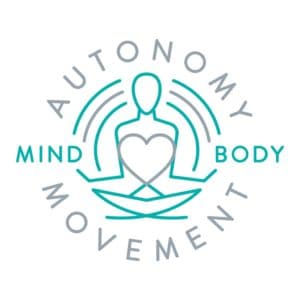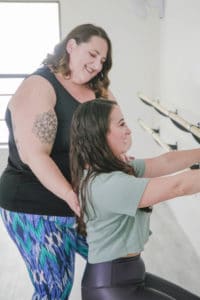
Kim Gould is a marriage and family therapist, personal trainer, and barre instructor living in Austin, Texas. She has a passion for helping clients with eating disorders and body image issues. Her work inspired her to begin a special kind of exercise studio called Autonomy Movement, designed to be inclusive and supportive instead of emphasizing weight loss. In a phone call with Kim we learned more about the mission of Autonomy Movement, the problems with the weight loss industry, and Kim’s love of scary movies.
What is the mission of Autonomy Movement?
Basically, to transform the way that the fitness and healthcare industries (that’s therapists, dietetics, psychiatrists, doctors) define health. It’s currently limited by fat phobia, which is the fear of gaining weight, and I think most people think health is diet and exercise and weight loss. But what most people don’t know is that research studies actually show that the intentional pursuit of weight loss and dieting behaviors over time are actually more destructive to our health long term. That’s because most studies that promote diet/exercise and weight loss in conjunction actually stop at two years. And around the two year mark is when some really destructive behaviors start emerging: yo-yo dieting can result in internal inflammation; compulsive exercise behaviors; food restriction; development of full-blown eating disorders… I won’t keep going, but I could! And so we at Autonomy want to teach both individuals and professionals how to connect to their bodies in ways that are actually going to promote positive health behaviors long term and actually help people connect to themselves in a more compassionate way to basically guarantee health long term.
What should somebody expect when they come to Autonomy Movement for the first time?
It really depends what they come for. So with Coronavirus we’re officially able to make all of our services virtual. Back in March we had been more in-person: we do have a physical studio in north Austin. However, it was really kind of exciting because we were then pushed to make everything virtual. So for clients, that means they can schedule to come in person and we would do services socially distanced. However, they can take without any type of virtual group workout classes, try personal training or a personal training group. We have online educational courses which they can take self-paced. And then a few of our instructors are still open to seeing clients in person. So if anyone’s in Austin they can email us and specify they want to try some of these services, socially-distanced, and then we just ensure that our instructors feel comfortable with that.
But mental health is also an incredibly important part of all this in general. We offer mental health counseling for individuals, couples, families, and groups. We are the only space like ours in Austin that offers what is called a fusion, which combines movement and psychotherapy, and are led by masters-level or fully-licensed health professionals who are trained in barre, yoga, strength and endurance training. So it’s basically like you go see a personal trainer who is also a therapist. It’s a really effective way of developing a relationship with someone who can create more safety in a physical movement space to help people move trauma through their bodies, help them restore their relationship with their physical body, and learn how to move safely.
Then for professionals (both healthcare and fitness professionals) we offer online courses and workshops that count for continuing education credit that can help them enhance their businesses. They can learn how to create more inclusivity and accessibility in their work with clients. We also offer business coaching for those professionals interested in learning how to make their brand more inclusive.
2020 must be a pretty interesting year to be running a new business!
Autonomy has been open for almost a full year now. We opened in November 2019 and it has been quite a wild ride. I feel much better now but it has been a learning curve that has been vertical. I do think things end up happening as they’re supposed to. Maybe that’s me being cliche. I hear people say ‘oh my gosh, it’s so hard with Coronavirus,’ and I totally agree. And yet we were able to create more accessibility with our services because it went fully virtual and people in New York and I think someone out of the country took one of our group fitness classes. I thought “that is so cool!” That would not have happened, we would not have the reach we maybe have now if not for everything happening.
What is a fun fact about you that clients or customers would not know?
I think most people get surprised when I say that I love scary movies. And most of my clients don’t know that at the end of a long day, if I’m feeling frazzled or burnt out or whatever it actually really helps me relax to put on something like Annabelle or Insidious. I have a twin sister and we’re both like this – my family doesn’t understand it! But at the end of the day all I want is to watch spooky things. And there is so much stress in the world, in our country… there’s so many scary things that we can’t control. But I know that the spooky stuff on my TV will end after one hour and forty-six minutes, give or take, and I can turn the TV off and remind myself that at least a murderous doll isn’t gonna pop out of the glass case. And that actually feels very intentionally reassuring.
It sounds like you have a pretty busy schedule. How do you stay energized and avoid burnout?
I promise this isn’t an ad, but logistically Google Calendars is a lifesaver, Calendly has been a god-send, and Planoly for my social media posts has been super helpful. So those are my three most commonly accessed apps. I’ve also really had to be honest about working on boundaries in my life, both energy boundaries and time boundaries. I just read the book Untamed and I know everyone’s got their own perspective on this because I know there’s plenty of books out there that say the same thing. But I think it was just validating – she has a chapter in there where she talks about just not being a good friend. And I think that’s so hard because being a generally socially compassionate person, I do want to be building people up and I do want to have all the time in the world. Yet I’m actually really introverted and so even people texting me “hey, how are you?” sends my anxiety skyrocketing. I don’t have the energy for small talk. It’s just not my thing, at all. And so more and more I’ve recognized that if I don’t want to respond to a text I don’t need to make myself and that doesn’t make me a bad person. And if I need to say “no” to plans just because I don’t want to do them I can do that and it doesn’t make me a bad friend. So I think it’s just creating more space for the authentic and not having to necessarily convince myself that I have to want to do things that really drain me. Also, making sure that I prioritize my day in terms of what needs to get done and offer myself some compassion and grace when, at the end of a 12-13 hours workday, I still have things on the list. It’s okay to not do them all in one day.
What do you think is the most harmful trend in the weight-loss industry?
The fact that there is a weight-loss industry is the biggest problem. It perpetuates fat phobia because it implies that thinner bodies have more value and that it’s even possible for a single person to achieve health simply by losing weight. One of the first episodes in Shrill is her in a coffee shop and some “fit,” tall, lean fitness instructor comes up to her and is like “you should join my workout group” and “there’s just a thin person inside you just waiting to blossom.” And to that I just want to scream “bullshit.” People need to educate themselves on what’s called “set point”; it’s the weight at which our body wants to be, determined predominantly by genetics, that does not adhere to societally acceptable aesthetics. Our set point changes over time – it’s a weight range. So when people say “I need to lose about five pounds and I’ve plateaued,” – have you considered that your body thinks you’re in a state of starvation and it’s not going to let you lose those last five pounds because your body cares about surviving and we’re not programmed for fitness or the values our culture has placed on weight loss?
So I would encourage every single person to do their research about set point because 1) there’s not one research study to date that can provide evidence that we have any control over our set point so our body will fight us every step of the way if we’re losing weight and it’s not our set point and 2) there is not one research study to date that can actively link intentional weight loss and dieting with improved health outcomes long term. In fact, there’s so much more research for the opposite, which is not actively known or widespread because most of the diet industry is paid for by large pharmaceutical companies. Those companies won’t make money if people aren’t scared of gaining weight.
What is one health product you think everyone should own?
I was reading this and I was wracking my brain and I had a few things pop into my head and the word that kept blaring loudly was “privilege.” No matter what I would pick, it’s like, but does everyone have access to that? I think that someone should own something and yet who am I to say that someone should be able to have x, y, z, because not everyone can afford it. That’s one of my biggest problems with the diet industry: it’s like “buy this, eat clean.” It prescribes so much crap that is so harmful, and is also so based on privilege. So, honestly, if I’m going to boil it down – an animal! If you have the privilege to own an animal, research shows that it regulates anxiety. A cat or a ferret might encourage intuitive movement because you’re playing with that animal. If you’re sobbing you get to wipe your tears away with your dog’s floppy ears. And you have something that loves you. Cats teach you boundaries and consent. So in a silly way I was thinking one product is a pet that you love. It teaches responsibility, boundaries, caretaking, consent, joy.
You can find more of Autonomy Movement on Facebook or Instagram. Visit their website for more information about intuitive movement and what actually impacts long-term health.

